Pragmatism
Notes
Pragmatism is the idea that instead of seeing truth as something absolute, external, abstract, we need to view truth as a tool. Something it is true if it "works", if it useful to us. For example, a classic debate around religion would be whether god exists or not. For a pragmatist however, the better question would be - does religion, or being religious improve our lives? does it make us better people? If the answer is yes, then we should be religious, and view god and it's teachings as something that is true, regardless whether we were able to find evidence to it's existence.
Therefore, pragmatism ties the idea of Utility to Truth, as opposed with Rationalism and Empiricism which both care about an absolute truth, and just disagree on how to get there.
At first glance it seems that pragmatism is related to Relativism, because when we talk about "usefulness", we mean useful to us. For example, religion can make one person better off, while the other does not. In that case, it is true to one person and not the other. However, while there are some edge cases, generally pragmatism is not relativist. The more scientific concept of truth often overlaps with the pragmatist concept of truth because in order for something to "work" for us, it usually requires it to be real. For example, gravity is true because if we ignore it, the way we live, the buildings we build, will be very hard. To see gravity as true is useful, and it is useful because it is true/proven. It's not "by chance" that we have this circular reasoning. As mentioned, when something is proven as true, then it is also pragmatically true Objectivism. Where pragmatism shines is in the opposite direction, that we consider as true things that have not yet (or can't be) proven scientifically as true Reverse Thinking.
Additionally, pragmatism brings forth the importance of action. Some philosophical debate seem very important, like the question of free will vs determinism, while the have no actual effect on our lives. Whether we believe in free will or not, we don't have access to the infinite facts required to see the deterministic path we walk on, so while philosophers might get stuck on that question, the pragmatist will ask "is believing in free will beneficial to us?". Most would say yes, that it is better to live in a way that believes in free will, because it gives us accountability and agency. It is like morality itself, there is no point in focusing on theory alone, because what matters is how it is implemented in our lives to be moral is to act moral. A pragmatist would always check if the idea is actionable, and which kind of results does it generates Experimentation, they will never be satisfied with theory alone.
Visual

Overview
🔼Topic:: Epistemology (Map) 🔼Topic:: Ethics (Map) ↩️Origin:: 🔗Link::